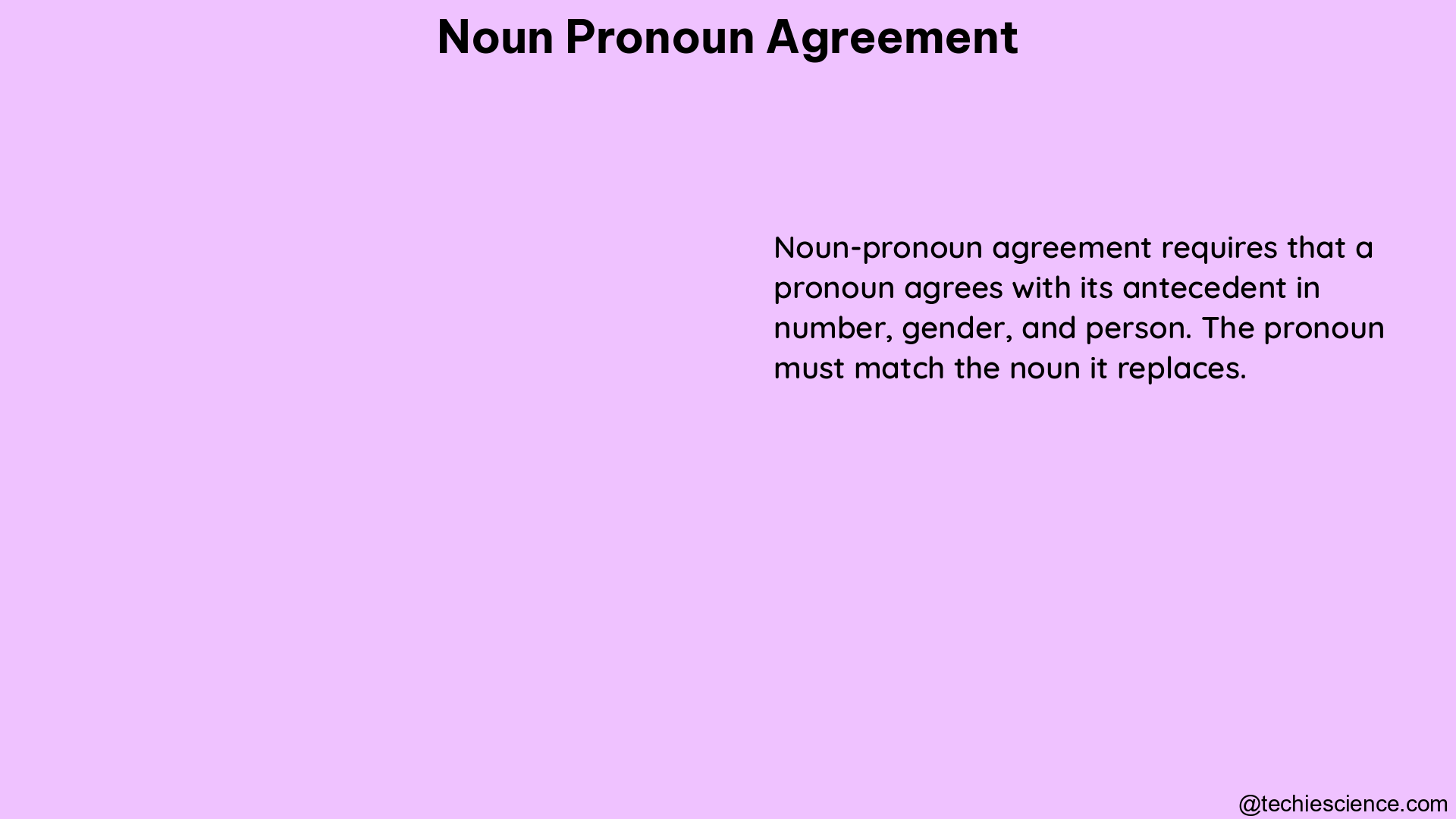Noun-pronoun agreement is a crucial aspect of English grammar that ensures clarity and coherence in written and spoken communication. It involves ensuring that pronouns agree with their antecedents (nouns) in number, person, and gender. This comprehensive guide will delve into the key principles, special considerations, and best practices for maintaining proper noun-pronoun agreement, equipping you with the knowledge to communicate effectively.
Key Principles of Noun-Pronoun Agreement
Number Agreement
- Singular Nouns: Singular nouns require singular pronouns.
- Example: “The student lost her notebook.”
- Plural Nouns: Plural nouns require plural pronouns.
- Example: “The students lost their notebooks.”
Person Agreement
- First-Person Pronouns: First-person pronouns (I, we) refer to the speaker.
- Example: “I am going to the library.”
- Second-Person Pronouns: Second-person pronouns (you) refer to the listener.
- Example: “You are going to the library.”
- Third-Person Pronouns: Third-person pronouns (he, she, it, they) refer to others.
- Example: “She is going to the library.”
Gender Agreement
- Masculine Nouns: Masculine nouns require masculine pronouns (he, him, his).
- Example: “The boy lost his hat.”
- Feminine Nouns: Feminine nouns require feminine pronouns (she, her, hers).
- Example: “The woman lost her keys.”
- Neutral Nouns: Neutral nouns require neutral pronouns (it, its).
- Example: “The cat lost its collar.”
Special Considerations

Compound Nouns
- Joined by “and”: Compound nouns joined by “and” require plural pronouns.
- Example: “John and Mary left their house.”
Collective Nouns
- Singular or Plural: Collective nouns can be singular or plural, depending on the context.
- Singular: “The team won because of its strategy.”
- Plural: “The team changed into their jerseys.”
Indefinite Pronouns
- Always Singular: Some indefinite pronouns are always singular (anybody, everyone).
- Example: “Everyone has cast his or her vote.”
- Always Plural: Some indefinite pronouns are always plural (both, few).
- Example: “Few of the days this spring have been above 50 degrees.”
- Singular or Plural: Some indefinite pronouns can be singular or plural (all, any).
- Example: “All of the students have submitted their assignments.”
Relative Pronouns
- Agreement with Antecedents: Relative pronouns agree with their antecedents in number.
- Singular: “John is the player who has scored in most of the games.”
- Plural: “John was one of the players who were chosen to play in the final game.”
Best Practices
Avoiding Ambiguity
- Use Nouns Instead of Pronouns: Use nouns instead of pronouns if the meaning is unclear.
- Example: “The client and the vendor agreed that the vendor would schedule the follow-up meeting.” (Clearer than using “he”)
Singular “They”
- Accepted in Academic Writing: Many academic publications accept the use of “they” as a singular pronoun to avoid gendered pronouns.
- Example: “The student hoped that they had reviewed their notes carefully.”
Conclusion
Mastering noun-pronoun agreement is essential for clear and coherent communication in English. By understanding the key principles of number, person, and gender agreement, as well as navigating the special considerations for compound nouns, collective nouns, indefinite pronouns, and relative pronouns, you can effectively convey your ideas and avoid ambiguity. Applying the best practices, such as using nouns instead of pronouns when necessary and embracing the singular “they,” will further strengthen your command of this fundamental aspect of English grammar.
References
- University of Arkansas. (n.d.). Pronoun/Noun (Antecedent) Agreement. Retrieved from https://walton.uark.edu/business-communication-lab/resources/downloads/Pronoun_noun_agreement_L.pdf
- Northern Illinois University. (n.d.). Pronoun Agreement. Retrieved from https://www.niu.edu/writingtutorial/grammar/pronoun-agreement.shtml
- Crowd Content. (n.d.). Noun-Pronoun Agreement Singular and Plural. Retrieved from https://crowdcontent.com/resources/writer/university/grammar/noun-pronoun-agreement-singular-and-plural/
- Walden University. (n.d.). Noun–Pronoun Agreement – Grammar and Mechanics. Retrieved from https://academicguides.waldenu.edu/formandstyle/writing/grammarmechanics/nounpronounagreement
- Walden University. (n.d.). Noun–Pronoun Agreement – Grammar. Retrieved from https://academicguides.waldenu.edu/writingcenter/grammar/nounpronounagreement

The lambdageeks.com Core SME Team is a group of experienced subject matter experts from diverse scientific and technical fields including Physics, Chemistry, Technology,Electronics & Electrical Engineering, Automotive, Mechanical Engineering. Our team collaborates to create high-quality, well-researched articles on a wide range of science and technology topics for the lambdageeks.com website.
All Our Senior SME are having more than 7 Years of experience in the respective fields . They are either Working Industry Professionals or assocaited With different Universities. Refer Our Authors Page to get to know About our Core SMEs.